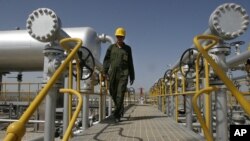A European Union embargo on Iranian oil that takes effect Sunday is the latest move in an international effort to force Tehran to halt its disputed nuclear program.
The EU and the United States want Iran to end development work that they say is intended to produce nuclear weapons. Iran says its nuclear program is for peaceful purposes. Talks on the issue have resulted in an impasse between western nations and Iran, the world's fourth largest oil producer.
Last week South Korea announced it will also halt Iranian oil imports, becoming the first major Asian buyer of Iranian oil to do so.
The impact of the sanctions, which were announced in January, is not yet clear. Iran produced more than 4 million barrels of oil a day in 2010, but its production fell to a 23-year low before the July 1 start date for the sanctions. Meanwhile, other oil-producing nations in the Gulf region have stepped up their oil drilling, so production levels for the Organization of Petroleum Exporting Countries (OPEC) are near a four-year high.
Slowing of the world economy has also weakened demand for oil in recent weeks, bringing its cost down from the near-record highs reached earlier this year.
Some information for this report was provided by AP, AFP and Reuters.
The EU and the United States want Iran to end development work that they say is intended to produce nuclear weapons. Iran says its nuclear program is for peaceful purposes. Talks on the issue have resulted in an impasse between western nations and Iran, the world's fourth largest oil producer.
Last week South Korea announced it will also halt Iranian oil imports, becoming the first major Asian buyer of Iranian oil to do so.
The impact of the sanctions, which were announced in January, is not yet clear. Iran produced more than 4 million barrels of oil a day in 2010, but its production fell to a 23-year low before the July 1 start date for the sanctions. Meanwhile, other oil-producing nations in the Gulf region have stepped up their oil drilling, so production levels for the Organization of Petroleum Exporting Countries (OPEC) are near a four-year high.
Slowing of the world economy has also weakened demand for oil in recent weeks, bringing its cost down from the near-record highs reached earlier this year.
Some information for this report was provided by AP, AFP and Reuters.





